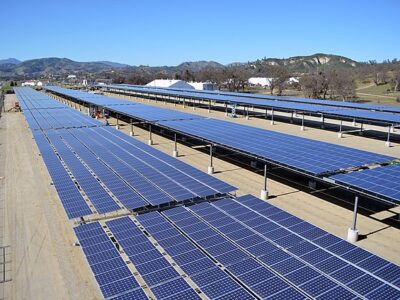Energy
35 Major Climate Initiatives Under Biden
By any measure, it has been an eventful four years for climate policy, with billions in spending and many major regulations finalized. Here’s a timeline of the Top 30 actions.
In light of President Biden’s withdrawal from the 2024 presidential race yesterday, we thought it was appropriate to update this piece about the climate legacy of the Biden-Harris Administration. In his four years in office, Donald Trump rolled back essentially every existing federal policy to limit climate change. The picture under the Biden Administration has …
Continue reading “35 Major Climate Initiatives Under Biden”
CONTINUE READING(Energy) Independence Day
A post in which I surprise readers — and myself — with strong praise for George W. Bush.
The only way to achieve energy independence is to achieve independence from fossil fuels. That’s not something we can achieve overnight, but the closer we come, the better — for our health, our national security, and the world.
CONTINUE READINGEPA’s New Power Plant Rules Have Dropped. What Happens Next?
Media battles. Lawsuits. Stay requests. And political mayhem.
The release of Biden’s new climate regulations for power plants will unleash a maelstrom of legal and political battles. One key question: Will the Supreme Court short circuit the litigation process by staying the rules.
CONTINUE READINGFive Myths and Half-Truths About California Cap and Trade
California has spent years fine-tuning its trading system, with results that aren’t always easy to gauge.
A key part of California’s climate policy has always been its cap and trade system. Because the regulations aren’t very transparent, there have been a lot of misconceptions about the system. I’ve been digging into the rules, the explanatory website set up by the California Air Resources Board (CARB), and secondary sources to try to …
Continue reading “Five Myths and Half-Truths About California Cap and Trade”
CONTINUE READINGNot All Community Benefits Are Created Equal
Technical Assistance for Underserved, Environmental Justice, and Tribal Communities Will Be Key to Ensuring Meaningful California Offshore Wind CBAs
CLEE has just released a new report, Offshore Wind & Community Benefits Agreements in California: CBA Examples, detailing the CBA and other community provisions in California’s offshore wind leases, as well as examples of CBA precursors and models from other industries. Read it here. As California offshore wind moves forward, there are opportunities for underserved, …
Continue reading “Not All Community Benefits Are Created Equal”
CONTINUE READINGThe Changing Politics of Coal
Coal has gone from a national conservative rallying cry to a niche state concern.
The “War Against Coal” was a major conservative theme eight years ago. Now it seems almost forgotten even by Donald Trump, who was once coal’s caped crusader. But although protecting coal production is no longer much of a national issue, keeping coal-fired power plants open has percolated as an issue at the state level. It …
Continue reading “The Changing Politics of Coal”
CONTINUE READINGA New Strategic Plan for California Offshore Wind
The California Energy Commission has published a draft including strategies for impacted communities, but CBAs deserve more emphasis.
For those following offshore wind development in California, January 19, 2024, marked an important moment—the release of the long-awaited Draft Assembly Bill 525 Offshore Wind Strategic Plan from the California Energy Commission (CEC). Some important foundations for offshore wind, a new but growing industry in California, had already been laid. Assembly Bill 525 (AB 525, …
Continue reading “A New Strategic Plan for California Offshore Wind”
CONTINUE READINGWindmills are Killing Our Donuts! And It’s All Biden’s Fault!
A peek inside the mind of a leading presidential candidate.
Donald Trump has been talking a lot about donuts lately. Donuts, it seems, are threatened by renewable energy and depend on fossil fuels. Maybe because he’s heard that they’re cooked in oil? Trump’s knowledge of cooking is likely pretty minimal, given that it’s unlikely he’s ever been inside a kitchen. And windmills are terrible, just …
Continue reading “Windmills are Killing Our Donuts! And It’s All Biden’s Fault!”
CONTINUE READINGThe Bumper Crop of New State Climate Policies Since July.
State governments aren’t sitting on their hands. Far from it. The pace of climate action is picking up.
State climate policy is a big deal. State governments began cutting emissions at a time when the federal government was essentially doing nothing about climate change. Since then, more states have become involved, and state policies have become more aggressive. it’s not for nothing that 2023 has been called a banner year for state climate …
Continue reading “The Bumper Crop of New State Climate Policies Since July.”
CONTINUE READINGWhen Communities Take Over Their Energy Systems
Is Local Control A Good Thing? It’s Complicated . . .
This Post was Co-Authored by Sharon Jacobs and Dave Owen. For many decades, most people in the United States have obtained their electricity from a large investor-owned utility company (IOU). They had no real choice. Much of U.S. energy law was built on the belief that the best way to provide electricity was to give …
Continue reading “When Communities Take Over Their Energy Systems”
CONTINUE READING












